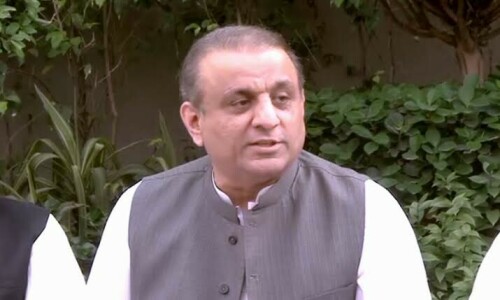ISLAMABAD: The Securities and Exchange Commission of Pakistan (SECP) registered 11,370 companies in 2017-18, raising the number of registered entities to 87,620 - a growth of 37 per cent.
The regulator on Friday released its 2017-18 report highlighting the future course of action to promote capital markets, corporate, non-banking financial and insurance sectors. The report mentions efforts SECP undertook to promote ease of doing business, reduce related costs and leverage technological advances.
“We have to reach out to our regulated entities and market participants to create markets that support capital formation, economic prosperity, level-playing field, transparency and removal of arbitrary and subjective decision-making,” SECP Chairman Shaukat Hussain stated.
The report also outlined SECP’s future plans for development of the capital markets by fostering a deeper linkage with the real economy. The regulator has announced plans to establish state-of-the-art facilitation centres at CROs in Karachi, Lahore and Islamabad, implementing the Companies (General Provisions & Forms) Rules and Foreign Companies Regulations.
SECP also shared plans to introduce a Shariah-based trading platform at PSX.
It also highlights that steps were taken to make incorporation easier, with the time for online registration reduced to four hours.
558 companies with a total paid-up capital of Rs1.29 trillion are listed at the Pakistan Stock Exchange (PSX) whose market capitalisation stood at Rs8.66tr as on June 30. The KSE-100 index began the year at 44,665.41 points and closed at 41,910.90, decreasing by almost 7pc.
The index touched its lowest level at 37,919.42 on Dec 19, 2017 while the peak was hit at 47,084.34 on Aug 3, 2017. The average daily turnover at the end of FY18 stood at 174.532 million shares.
The Centralised Customer Protection and Compensation Fund replaced the previous Investor Protection Fund of PSX and is operational, offering adequate safety net to investors trading against broker default.
Moreover, PSX was granted a license to operate as a futures exchange under the Futures Exchanges (Licensing and Operations) Regulations, 2017.
The SECP approved futures commodity contracts including Brent crude, crude oil (1,000 barrels), copper (25,000 pounds), silver (5,000oz) and international cotton (50,000 pounds), which were launched at Pakistan Mercantile Exchange.
Meanwhile, the asset size of the non-banking finance (NBF) sector stood at Rs1.22tr by FY18 end from Rs1.19tr the previous year, reflecting an overall increase of 2.70pc.
A senior official of SECP said investments witnessed a decline in 2017-18 mainly due to political reasons as market sentiments are generally sluggish during election years the world over.
Five companies, including two modarabas, offered shares/modaraba certificates to the public as compared to four last year, while 25 microfinance institutions had been successfully licensed with total assets of Rs97.17 billion.
In 2017, premium revenue of life and non-life insurers grew by 18pc and 12pc, respectively. The former sector underwrote premium of Rs213.6bn while the latter recorded Rs94.8bn worth of premium.
Published in Dawn, September 29th, 2018












































